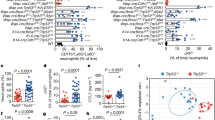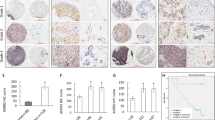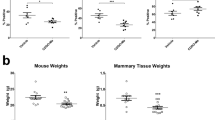Abstract
Inflammatory mechanisms influence tumorigenesis and metastatic progression even in cancers whose aetiology does not involve pre-existing inflammation or infection, such as breast and prostate cancers1. For instance, prostate cancer metastasis is associated with the infiltration of lymphocytes into advanced tumours and the upregulation of two tumour-necrosis-factor family members: receptor activator of nuclear factor-κB (RANK) ligand (RANKL) and lymphotoxin2. But the source of RANKL and its role in metastasis have not been established. RANKL and its receptor RANK control the proliferation of mammary lobuloalveolar cells during pregnancy3 through inhibitor of nuclear factor-κB (IκB) kinase-α (IKK-α)4, a protein kinase that is needed for the self-renewal of mammary cancer progenitors5 and for prostate cancer metastasis2. We therefore examined whether RANKL, RANK and IKK-α are also involved in mammary/breast cancer metastasis. Indeed, RANK signalling in mammary carcinoma cells that overexpress the proto-oncogene Erbb2 (also known as Neu)6, which is frequently amplified in metastatic human breast cancers7,8, was important for pulmonary metastasis. Metastatic spread of Erbb2-transformed carcinoma cells also required CD4+CD25+ T cells, whose major pro-metastatic function was RANKL production. Most RANKL-producing T cells expressed forkhead box P3 (FOXP3), a transcription factor produced by regulatory T cells, and were located next to smooth muscle actin (SMA)+ stromal cells in mouse and human breast cancers. The dependence of pulmonary metastasis on T cells was replaceable by exogenous RANKL, which also stimulated pulmonary metastasis of RANK+ human breast cancer cells. These results are consistent with the adverse impact of tumour-infiltrating CD4+ or FOXP3+ T cells on human breast cancer prognosis9,10 and suggest that the targeting of RANKL–RANK can be used in conjunction with the therapeutic elimination of primary breast tumours to prevent recurrent metastatic disease.
This is a preview of subscription content, access via your institution
Access options
Subscribe to this journal
Receive 51 print issues and online access
$199.00 per year
only $3.90 per issue
Buy this article
- Purchase on Springer Link
- Instant access to full article PDF
Prices may be subject to local taxes which are calculated during checkout




Similar content being viewed by others
Change history
23 February 2011
A correction was made to the Acknowledgements.
References
Grivennikov, S. I., Greten, F. R. & Karin, M. Immunity, inflammation, and cancer. Cell 140, 883–899 (2010)
Luo, J. L. et al. Nuclear cytokine-activated IKKα controls prostate cancer metastasis by repressing Maspin. Nature 446, 690–694 (2007)
Fata, J. E. et al. The osteoclast differentiation factor osteoprotegerin-ligand is essential for mammary gland development. Cell 103, 41–50 (2000)
Cao, Y. et al. IKKα provides an essential link between RANK signaling and cyclin D1 expression during mammary gland development. Cell 107, 763–775 (2001)
Cao, Y., Luo, J. L. & Karin, M. IκB kinase α kinase activity is required for self-renewal of ErbB2/Her2-transformed mammary tumor-initiating cells. Proc. Natl Acad. Sci. USA 104, 15852–15857 (2007)
Guy, C. T. et al. Expression of the neu protooncogene in the mammary epithelium of transgenic mice induces metastatic disease. Proc. Natl Acad. Sci. USA 89, 10578–10582 (1992)
Slamon, D. J. et al. Studies of the HER-2/neu proto-oncogene in human breast and ovarian cancer. Science 244, 707–712 (1989)
Tiwari, R. K., Borgen, P. I., Wong, G. Y., Cordon-Cardo, C. & Osborne, M. P. HER-2/neu amplification and overexpression in primary human breast cancer is associated with early metastasis. Anticancer Res. 12, 419–425 (1992)
Bohling, S. D. & Allison, K. H. Immunosuppressive regulatory T cells are associated with aggressive breast cancer phenotypes: a potential therapeutic target. Mod. Pathol. 21, 1527–1532 (2008)
Ohara, M. et al. Possible involvement of regulatory T cells in tumor onset and progression in primary breast cancer. Cancer Immunol. Immunother. 58, 441–447 (2009)
Dougall, W. C. et al. RANK is essential for osteoclast and lymph node development. Genes Dev. 13, 2412–2424 (1999)
Body, J. J. et al. Effects of denosumab in patients with bone metastases, with and without previous bisphosphonate exposure. J. Bone Miner. Res. 25, 440–446 (2010)
Fizazi, K. et al. Randomized phase II trial of denosumab in patients with bone metastases from prostate cancer, breast cancer, or other neoplasms after intravenous bisphosphonates. J. Clin. Oncol. 27, 1564–1571 (2009)
Ercolini, A. M. et al. Recruitment of latent pools of high-avidity CD8+ T cells to the antitumor immune response. J. Exp. Med. 201, 1591–1602 (2005)
Hsu, H. et al. Tumor necrosis factor receptor family member RANK mediates osteoclast differentiation and activation induced by osteoprotegerin ligand. Proc. Natl Acad. Sci. USA 96, 3540–3545 (1999)
Jones, D. H. et al. Regulation of cancer cell migration and bone metastasis by RANKL. Nature 440, 692–696 (2006)
Kawai, T. et al. B and T lymphocytes are the primary sources of RANKL in the bone resorptive lesion of periodontal disease. Am. J. Pathol. 169, 987–998 (2006)
DeNardo, D. G. et al. CD4+ T cells regulate pulmonary metastasis of mammary carcinomas by enhancing protumor properties of macrophages. Cancer Cell 16, 91–102 (2009)
Fontenot, J. D., Gavin, M. A. & Rudensky, A. Y. Foxp3 programs the development and function of CD4+CD25+ regulatory T cells. Nature Immunol. 4, 330–336 (2003)
Karnoub, A. E. et al. Mesenchymal stem cells within tumour stroma promote breast cancer metastasis. Nature 449, 557–563 (2007)
Luboshits, G. et al. Elevated expression of the CC chemokine regulated on activation, normal T cell expressed and secreted (RANTES) in advanced breast carcinoma. Cancer Res. 59, 4681–4687 (1999)
Gao, J. L. et al. Structure and functional expression of the human macrophage inflammatory protein 1α/RANTES receptor. J. Exp. Med. 177, 1421–1427 (1993)
Gobert, M. et al. Regulatory T cells recruited through CCL22/CCR4 are selectively activated in lymphoid infiltrates surrounding primary breast tumors and lead to an adverse clinical outcome. Cancer Res. 69, 2000–2009 (2009)
Bates, G. J. et al. Quantification of regulatory T cells enables the identification of high-risk breast cancer patients and those at risk of late relapse. J. Clin. Oncol. 24, 5373–5380 (2006)
Liao, D., Luo, Y., Markowitz, D., Xiang, R. & Reisfeld, R. A. Cancer associated fibroblasts promote tumor growth and metastasis by modulating the tumor immune microenvironment in a 4T1 murine breast cancer model. PLoS ONE 4, e7965 (2009)
Gonzalez-Suarez, E. et al. RANK ligand mediates progestin-induced mammary epithelial proliferation and carcinogenesis. Nature 468, 103–107 (2010)
Schramek, D. et al. Osteoclast differentiation factor RANKL controls development of progestin-driven mammary cancer. Nature 468, 98–102 (2010)
Acknowledgements
We thank L. Coussens for discussions and suggestions, V. Temkin and G. He for advice, and H. Herschman for critical reading. Work was supported by the National Institutes of Health (NIH). W.T. and W.Z. were supported by postdoctoral fellowships from Susan G. Komen for the Cure. A.S. was supported by NIH Asthma Research and Cancer Therapeutic training grants, and S.G. was supported by a research fellowship from the Crohn’s and Colitis Foundation of America. M.K. is an American Cancer Society research professor.
Author information
Authors and Affiliations
Contributions
W.T., W.Z., A.S. and M.K. designed the research. W.T., W. Z. and A.S. performed most of the experiments and analysed the data. W.T., W.Z., A.S. and M. K. wrote the manuscript. S.G. performed some of the experiments and analysed their data. J.Q.C. and R.M.H. provided essential reagents, in vivo imaging and technical discussions.
Corresponding author
Ethics declarations
Competing interests
The authors declare no competing financial interests.
Supplementary information
Supplementary Information
The file contains Supplementary Figures 1-18 with legends, Supplementary Methods and additional references. (PDF 2729 kb)
Rights and permissions
About this article
Cite this article
Tan, W., Zhang, W., Strasner, A. et al. Tumour-infiltrating regulatory T cells stimulate mammary cancer metastasis through RANKL–RANK signalling. Nature 470, 548–553 (2011). https://doi.org/10.1038/nature09707
Received:
Accepted:
Published:
Issue Date:
DOI: https://doi.org/10.1038/nature09707
This article is cited by
-
The mitochondrial DNA common deletion as a potential biomarker of cancer-associated fibroblasts from skin basal and squamous cell carcinomas
Scientific Reports (2024)
-
The Impact of Non-bone Metastatic Cancer on Musculoskeletal Health
Current Osteoporosis Reports (2024)
-
The Role of Breast Cancer Cells in Bone Metastasis: Suitable Seeds for Nourishing Soil
Current Osteoporosis Reports (2024)
-
Metastasis of breast cancer to bones alters the tumor immune microenvironment
European Journal of Medical Research (2023)
-
Fibroblast diversity and plasticity in the tumor microenvironment: roles in immunity and relevant therapies
Cell Communication and Signaling (2023)
Comments
By submitting a comment you agree to abide by our Terms and Community Guidelines. If you find something abusive or that does not comply with our terms or guidelines please flag it as inappropriate.



